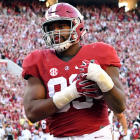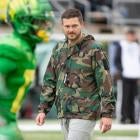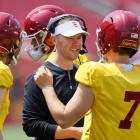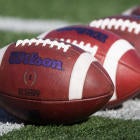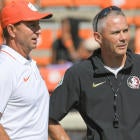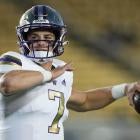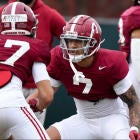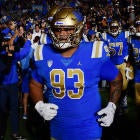The best defensive player in college football wonders about his mother. Alabama's Jonathan Allen rarely talks about looking back, even though the past shaped who he is today.
What good does it do for Allen to remember how he lived hotel to hotel and in foster care for 10 months as a young child? How does it help to try to discuss the tough times he and his brother shared with his biological mother before she lost custody?
What matters most to Allen is a brother, Richard III, who's seven years older and was always his protector. What matters is a loving stepmother, Traci Allen, who got Jonathan back on track in school to catch up with his age group. What matters is a military father, Richard Allen, who let the boys play football only if they got straight A's and pushed Jonathan hard to have the discipline and work ethic that makes him one of Nick Saban's favorite players ever.
"It was tough not having my mom around, but you've got to be tough," Allen said. "Tough times require tough people. Everything you've got to do is hard. As long as I have an older brother, it really didn't matter, to be honest. As long as I had my brother, everything was good."
Still, Allen is curious about the mother he hasn't seen since third grade. The family doesn't know where she is. The boys' father said the courts removed the children from their mother's custody in 2004 and required her to receive a psychological evaluation before speaking to them again.
"I've been trying, but I don't know how to get in contact with her," Jonathan said. "No idea where she lives. ... It would mean a lot [to talk to her]. I would love to. That's my mom. You never replace your mom, even though my stepmom, I love her to death. She's been great. But there's nothing like your mom, you know?"
Richard III said he hopes his brother's new fame can help them find their mother.
"I just have questions," Richard III said. "Even though I'm older than Jonathan, I was still very young, too. What happened? Why haven't we had contact with her? Where is she?"
The present and future are bright for Allen. He skipped leaving early for the NFL in 2015 to become the first Alabama player with a national defensive player of the year award. He's one win away from a second straight national championship. He's on the verge of being one of the first five players selected in the 2017 NFL Draft.
But the past shows how Allen reached this point. The past shows how he carefully and diligently crafted his career with focus and planning that was missing from his early years when he was filled with rage.
"It definitely shaped who I am," Allen said of his childhood. "I try not to take things for granted. I just try to control what I can control."
Losing touch with his mother
Allen was born in Anniston, Alabama, and lived there less than a year when his father's military service took the family to Pittsburgh. Richard, a nuclear biological chemical specialist in the Army, got deployed to South Korea and then was based in Fort Lewis near Tacoma, Washington.
The children stayed with their mother in Pittsburgh. Richard III said they lost touch with their father for a period of time. Later, the brothers separated as Richard III lived with their dad and Jonathan stayed with their mom for about five years.
At one point, child custody services in South Carolina intervened because Jonathan missed so much school that he later repeated the second grade, according to his brother. A custody battle ensued between Allen's father and mother.
According to the Washington Post, a judge ruled that Jonathan and Richard III couldn't return to their mother because "doing so would cause an unreasonable risk of harm to the children's life, physical health, safety and mental well-being." The judge found the children were "educationally neglected." The Post reported that court records show the mother missed all three required appointments for a psychological evaluation.
As the custody battle dragged out, the Allen brothers said they moved from hotel to hotel because of money. They lived in a foster building with about 30 children. They moved in with a foster mother named Miss Johnson.
Richard III said he would take Jonathan to task for crying in the foster homes, reminding him they still had food, clothes and a house. In hindsight, Richard III said he and his dad were probably too hard on Jonathan.
"We learned at an early age to be strong, not show emotions, things like that," Richard III said. "I wanted to make sure even though my dad wasn't there, I was there for Jonathan and being the best big brother I can be. He was 5, 6, 7 years old going through this. I can only imagine what Jonathan went through. I wanted him to know at least he had a big brother and somebody who was on his side."
Richard said when he finally got custody of Jonathan at age 9, "he had a lot of anger issues." The brothers moved with Richard to the state of Washington before they all headed to Virginia for a more stable life.
"Our stepmom really became a great figure for both of us," Richard III said. "She made us study at the dinner table for two hours after school."

Jonathan's anger problems helped in one area: He showed flashes at a young age of being a special football player by holding his own in backyard games with his brother and older kids. At 8 years old, he would be hit by 15-year-old kids, get up without crying and come back for more.
"He was running at them as hard as anybody else," Richard III said. "He wasn't scared. I knew if he could do that against kids seven years older than him, kids his age wouldn't stand a chance against him."
For a while, Jonathan's father didn't know how good his son could be in football. Richard said he focused on educating his children because he knows the statistics. An incredibly small number of football players ever play in college, much less the NFL.
The Allen brothers had to get straight A's to play football. That's why Richard III, a C student who's now an Army staff sergeant stationed at Fort Carson, Colorado, never played the game formally. Jonathan kept his grades up, though at one point in high school, his grades slipped and his dad threatened to remove him from the team.
Competition became a place for Jonathan to channel his anger, whether in video games (he loved playing with the then-St. Louis Rams in "Madden NFL" battles) or foot races with his brother. If Jonathan lost, he would practice and challenge his brother to compete against him again.
"I hate losing more than I like winning," he stressed.
Jonathan focused on improving his craft and trying to outwork everybody. His dad gave him examples of the work ethic of elite athletes, such as how Ray Lewis played football with a controlled rage.
Richard especially stressed to his son an answer NBA legend Larry Bird once gave a reporter when asked what made him so great. He recalled Bird saying that, by all accounts, he shouldn't have become a basketball player since he couldn't run as fast or jump as high as others. But Bird believed he succeeded because his father made him take 100 shots on a different spot of the court every day before coming home.
"Jonathan's version of this was he was told to play every play as if it's the last play of the Super Bowl and everybody is depending on him to make the game-winning stop at the goal line," Richard said. "Not only was this the last play of the Super Bowl, it was the last play of his career. He would never play another play and everyone would remember him by that play."
Jonathan Allen smiled last week when he heard his father's mantra repeated to him.
"We talked about that my first football practice and that's something that always stuck with me," he said. "You never know when it's going to be your last play. To this day, I still keep that in the back of my mind. When you think about it, it's true. I could blow my knee out -- knock on wood -- and never play another down of football. If you loaf or BS on the last play, I assume you'd be pretty pissed off."
Rage on the high school field
On a mid-December afternoon inside the halls of Stone Bridge High School in Ashburn, Virginia, two students approached a photo hanging on a wall near the gym. "There he is," one of the students said, pointing to a framed picture of Allen that recognizes his high school accomplishments.
This happens quite frequently at Allen's old high school.
"Every one kind of stops there if they haven't seen it before and know Jon went here," said Ben West, Allen's high school basketball coach. "Sometimes they'll take pictures. Sometimes when people come to football games, they try to get into the school to look at that. It's kind of funny. He's a big, big deal around here."
No one knew quite what to make of Allen when he first showed up at Stone Bridge midway through his freshman year. He had transferred from Western Branch High School in Chesapeake, and his father said he had no idea they were moving into a school district with a football power.
Allen had always played running back and cornerback. But during his first seven-on-seven drills that winter, Stone Bridge coach Mickey Thompson saw a 6-foot-3, 185-pound kid who was dropping passes and had issues with his footwork.
There was consideration of possibly cutting Allen before the season. Thompson said he knew he had a good athlete in Allen but worried he would be buried on the depth chart without changing positions.
On his questionnaire asking where he wanted to play his first season, Allen wrote down middle linebacker. That position was filled, so Stone Bridge tried Allen on the defensive line. Never mind that Allen had never lined up in a three-point stance in his life.
"It wasn't pretty and we didn't push it too hard," Thompson said. "We started bringing him off the edge. Alabama's done a fantastic job with him when I see the evolution of him now because it's not his natural position growing up."
Ridiculously, Allen set the school sack record with 22 as a sophomore in his first year at defensive end. Not only was Allen a great athlete, he deciphered the snap count to anticipate coming off the ball faster, something he not-so-wisely revealed to the media that season.
"The very next game he had like four offsides because they varied the snap count," his father said. "That was a good lesson: Don't give your secret away."
Opponents and fans quickly became aware of Allen. Some of his plays were freakish, such as running 30 yards to chase down a ball-carrier or blowing up option runs at each stage of the play.
Initially, Thompson became frustrated that Allen wouldn't stay in his gap. But Thompson came to realize he had a different type of person on his hands, one who simply needed to be allowed to play.
"He would hit the [fullback] dive, realize he doesn't have the ball, run to the quarterback who now has the ball, and then run to the pitch man when he got the ball," Thompson said. "We're like, 'OK, we can do it that way too.' It was pretty awesome stuff so you'd sit there mesmerized because we'd get up big in a lot of games, and all of a sudden, I'm not even aware of what other guys are doing and coaching the way I should because you're just watching him."
Thompson couldn't believe how often Allen spun correctly into a running back or quarterback at the precise moment needed. An inside move would have worked, but Allen often spun instead and still succeeded.
Allen used to watch great NFL defensive ends' spin moves on TV and practice his own in the living room. He could never explain to Thompson why instinctively he would spin. He just did it.
Stanford quarterback Ryan Burns, a teammate at Stone Bridge, joked that he wanted popcorn on the bench to watch Allen's plays.
"The speed off the ball was incredible," Burns said. "He would take control of games and speed would be why. He was a great guy and on the field he kind of turned into a different guy -- in a good way."
Allen gained a reputation of flipping from mild-mannered Bruce Banner off the field into The Incredible Hulk on it. Thompson said his relationship with Allen wasn't always the smoothest because he coached him hard. Allen was so intense that Thompson convinced him to go half-speed at practices to spare other players from getting hurt or destroying their confidence.
"If you saw him off the field, you'd see what a gentle giant he was, and if you saw him on the sideline one time, you'd be bug-eyed going, 'Oh my God,'" Thompson said. "He just played with an absolute rage that is unmatched with anything I've seen. I don't know how to say it any other way but a rage. You were in awe of the intensity."
Allen said he used to "lose control" of himself while at Stone Ridge and believes he now better handles his emotions.
Allen drew a rare unsportsmanlike conduct penalty late in the College Football Playoff Semifinal game last week against Washington as emotions flared. ESPN reported Allen called the Huskies "sorry" at halftime, a statement he denied making. After the game, Allen said Alabama players need to better control their emotions.
Allen's intensity was also evident in high school basketball while he averaged 11 points and eight rebound per game. He still holds Stone Bridge's record for rebounds in a game (28). West, Stone Bridge's basketball coach, once made the mistake of trying to box out Allen in practice as an example to the team on how to rebound.
"He did like you've probably seen a thousand times with Alabama -- the slap, the swim and he probably moved me three feet," West said. "After that point, I'm like, 'I'll never use him as an example again.' He's just different."
At away Stone Bridge basketball games, opposing fans showed up just to see Allen because of his football success. They tried to get under his skin with chants, some of them derogatory. West said Allen simply smiled and then fans stuck around afterward to meet him and get a photo.
"We're waiting on the bus because Jonathan's signing autographs for fans of the other team," West said. "He was like a traveling sideshow."

Yes, West said, there were times he had to take Allen out of the game to calm him down. But West also remembers how Allen reacted after Stone Bridge lost a game on a controversial finish and one of his teammates angrily tried to hunt down the referee.
"Jon grabbed the kid, pulled him aside and said, 'Shut up, get in line and shake the other team's hand,'" West said. "When Jon says to do something like that, kids listen."
Kathleen Thompson, Allen's English teacher his senior year, said he became a personal protector for her in class. "One kid tried to call attention to himself, and Jon made it pretty clear that wasn't going to fly," she said. "He's very, very loyal and conscientious."
Allen liked trying new sports at Stone Bridge. He was such a good athlete that, as a senior, he set a school record in the discus with a 147-foot throw and won the district championship. That was the first year he tried discus, an event in track and field that usually takes a long time to learn.
"I've never had any kid pick up discus in a year," said Bob Mandes, Stone Bridge's track coach. "I asked him once why he was even doing this. He knew he was good in football, not in an arrogant way, but he knew he was going on to college. But he just wanted to be with everybody, and since he was there, he worked, which I appreciated."
Picking Alabama, sticking with the Tide
The first scholarship offer for Allen came from Boston College. That was the first sign to Allen's father how special his son might be. If someone would have told Allen's father years earlier that Boston College would offer his son a free education, he would have jumped at it.
Other offers slowly started to come in. One school that didn't offer until much later in the process was Virginia Tech. The in-state Hokies previously signed productive players from Stone Bridge, which is one of the top teams in Virginia and has a 175-30 record since 2002.
"[Allen] really liked Tech and he took offense to that," Thompson said. "That motivated him even more. I was taken aback, too. I told them I've got the best player that's probably ever played here. I'm never wrong. Almost all the guys we put in Division I have gone on to start. Virginia Tech was concerned about his weight. They didn't know if he could play on the outside."
Then-Florida defensive coordinator Dan Quinn, now coaching the Atlanta Falcons, spent a lot of time recruiting Allen in Virginia. Allen was very close to committing to the Gators, who his dad liked. Alabama's pursuit, with one visit by Saban, changed everything.
When they were younger, Allen used to tell his brother he would play for the Crimson Tide. Allen and his father considered the pros and cons of going to Alabama. One of the biggest positives: Given the talent Alabama recruits, Allen would know immediately if he could cut it in football, and if not, he could focus more on an undergrad and master's degree.
Allen's father said Alabama was "pretty much a done deal" after Allen met Crimson Tide strength and conditioning coach Scott Cochran, whose energy, vibe and talk of improving appealed to Allen before he even met Saban or defensive coordinator Kirby Smart on his official visit.
Alabama first tried Allen at "Jack" linebacker. But when Allen, unlike many other freshmen, didn't lose weight during his first fall camp, Saban decided to move him to the defensive line, which was Allen's preference despite not knowing how to line up in a three-point stance just a couple years earlier.
Allen quickly made an impression. He played 12 games as a reserve in 2013 as a true freshman before starting most of his sophomore year while recording 11.5 tackles for loss. As a junior, Allen recorded 12 sacks but was still in a rotation on Alabama's deep defensive line and only started 11 of 15 games.
The NFL looked like a very real possibility. Allen's dad wanted him to go. Richard said a couple NFL general managers advised that Allen would take a big risk by returning for potentially little gain.
"Initially, he really wanted to go because he didn't like the [Alabama] rotation," Richard said. "He complained about it an awful lot. He wanted to play more. Good players want to play so that's understandable."
NFL evaluators gave Allen a draft grade of the first or second round. When they learned Allen needed shoulder surgery to fix a torn labrum, his grade changed to second or third round.
"It was kind of hard when your dad is saying he thinks you're the best and a coach is really advising me to come back," Allen said. "I had to take a step back to make a decision myself. ... I wasn't satisfied [with the second or third round]. I kind of just had to make a business decision, even though I had to go against my Pops. I had to do what I thought was best for me."
Allen believed he had more to gain than lose by returning. His brother said Allen knew the family is fortunate and doesn't rely on his future wealth.
This season, Allen showed even more diversity by being able to play inside and outside while holding the point of attack and rushing the passer. Allen leads Alabama's top-rated defense in sacks (9.5), tackles for loss (15.5), quarterback hurries (15), fumble recoveries (three), and he's tied for fourth in tackles (62) while also scoring two touchdowns on defense.
"I think Jonathan wanted to be a Heisman finalist," his father said of an honor that didn't come. "He's realistic to know he probably would never win, but he was a little disappointed not to be a finalist."
The "wow" plays Allen displayed in high school showed up in a big way during 2016, especially his "Superman" sack against Texas A&M. After seeing Allen leap over a blocker to tackle the quarterback, his high school coach thought to himself, "I've seen that before." Thompson compared it to the time in high school Allen leaped over three personal protectors to block a punt.
Richard, who now acknowledges Allen made the right call by returning for his senior year, asked Allen why he even thought to launch himself for the "Superman" sack. Texas A&M's running back tried to cut him on the game's first play, so Allen knew he would launch when the back went low.
"I said, 'You know, that's a very risky move you did because if the quarterback took a step to the right or a step to the left, you'll look pretty stupid,'" Richard said. "He said everything was happening so fast, he just reacted."
Life is about to get faster for Allen, who graduated in December with a degree in financial planning. One reason he took that major is he doesn't want to be a millionaire NFL player who eventually ends up broke.
Allen will settle on an agent soon after the CFP National Championship next week and go to a fitness camp to prepare for the NFL Combine. Then comes the draft and wherever the NFL takes him.
For now, there's still one more game for Allen to avoid losing. The player who hates losing more than he loves winning barely celebrated Alabama's semifinal win over Washington last week, joining his teammates on the Peach Bowl championship podium later than almost everyone else.
As a high school senior, Allen lost his final game when Stone Bridge fell in the Virginia Division 5 state championship. The offense lost a fumble at the opponents' 8-yard line with about one minute left.
"I think about it all the time," Allen said. "It pisses me off. We should have won that game."
What if Allen is in on the last play Monday? What if everyone depends on him to make the goal-line stop and that one play is how he'll be remembered? Allen considered that so many times growing up as he turned rage from his childhood into becoming the best defensive player in college football.
Allen stressed that he never thought of his childhood as being too difficult. "It was what it was," he said. "My brother was my protector, so I try to be the brother to my little siblings that he was to me."
But he wonders about his mom.
"It's my mom," Allen said. "I just want to know what happened to her."












